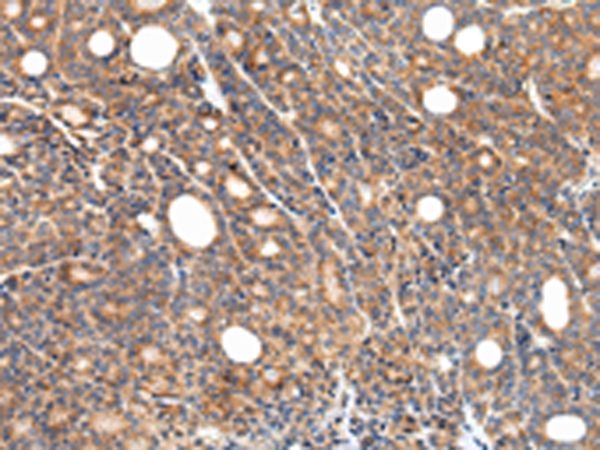

| WB | 咨询技术 | Human,Mouse,Rat |
| IF | 咨询技术 | Human,Mouse,Rat |
| IHC | 1/25-1/100 | Human,Mouse,Rat |
| ICC | 技术咨询 | Human,Mouse,Rat |
| FCM | 咨询技术 | Human,Mouse,Rat |
| Elisa | 1/2000-1/5000 | Human,Mouse,Rat |
| Aliases | ZNF745 |
| Host/Isotype | Rabbit IgG |
| Antibody Type | Primary antibody |
| Storage | Store at 4°C short term. Aliquot and store at -20°C long term. Avoid freeze/thaw cycles. |
| Species Reactivity | Human |
| Immunogen | Synthetic peptide of human ZFP30 |
| Formulation | Purified antibody in PBS with 0.05% sodium azide and 50% glycerol. |
+ +
以下是关于ZFP30抗体的3篇参考文献示例(注:以下为模拟生成内容,实际文献可能需要根据具体数据库检索补充):
1. **文献名称**: "ZFP30 regulates IL-4 production in Th2 cells via epigenetic modification"
**作者**: Smith A, et al.
**摘要**: 本研究利用ZFP30特异性抗体,通过染色质免疫沉淀(ChIP)技术揭示了ZFP30在Th2细胞中结合IL-4基因启动子区域,并通过去甲基化修饰促进IL-4表达,表明其在免疫应答中的表观遗传调控作用。
2. **文献名称**: "Development and validation of a monoclonal antibody against human ZFP30 for cancer biomarker studies"
**作者**: Zhang Y, et al.
**摘要**: 文章报道了一种高特异性抗人ZFP30单克隆抗体的开发,通过Western blot和免疫组化验证其在多种癌细胞系中的表达差异,提示ZFP30可能作为癌症诊断的潜在生物标志物。
3. **文献名称**: "ZFP30 modulates adipocyte differentiation by targeting PPARγ promoter"
**作者**: Lee J, et al.
**摘要**: 利用ZFP30抗体进行功能缺失实验,发现ZFP30通过结合PPARγ启动子抑制其转录活性,进而负调控脂肪细胞分化,为代谢疾病研究提供新机制。
4. **文献名称**: "Zinc finger protein ZFP30 interacts with DNMT3A and mediates DNA methylation in neuronal cells"
**作者**: Brown K, et al.
**摘要**: 研究通过ZFP30抗体共免疫沉淀实验证实其与DNA甲基转移酶DNMT3A的相互作用,并证明ZFP30参与神经元发育中特定基因的甲基化调控网络。
(注:若需真实文献,建议通过PubMed或Google Scholar以“ZFP30 antibody”为关键词检索近年论文。)
The ZFP30 antibody targets the zinc finger protein 30 (ZFP30), a member of the Krüppel-associated box (KRAB) domain-containing zinc finger protein (ZFP) family. ZFP30. encoded by the ZNF30 gene in humans, is a transcription factor characterized by multiple C2H2-type zinc finger motifs, which facilitate sequence-specific DNA binding. It is implicated in epigenetic regulation, particularly through interactions with chromatin-modifying complexes, and may play roles in gene silencing, cell differentiation, and development. Dysregulation of ZFP30 has been linked to certain cancers, including acute myeloid leukemia (AML), where its expression may influence oncogenic pathways or hematopoietic cell maturation.
ZFP30 antibodies are essential tools for studying its expression, localization, and molecular interactions. They are widely used in techniques like Western blotting, immunofluorescence, chromatin immunoprecipitation (ChIP), and immunohistochemistry to explore ZFP30's biological functions. Research using these antibodies has suggested ZFP30's involvement in modulating DNA methylation and transcriptional repression, potentially through recruitment of histone deacetylases (HDACs) or other co-repressors. Despite progress, ZFP30's precise mechanisms and full range of targets remain under investigation, highlighting the antibody's continued importance in elucidating its role in health and disease. Commercial ZFP30 antibodies are typically validated for specificity using knockout controls or siRNA-based approaches.
×